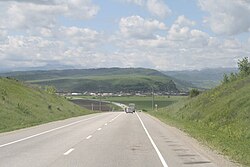Urvansky District
Urvansky District
Урванский район | |
|---|---|
| Other transcription(s) | |
| • Kabardian | Аруан къедзыгъуэ |
| • Karachay-Balkar | Урван район |
 Psyguensu, Urvansky District | |
 Location of Urvansky District in the Kabardino-Balkarian Republic | |
| Coordinates: 43°33′N 43°51′E / 43.550°N 43.850°ECoordinates: 43°33′N 43°51′E / 43.550°N 43.850°E | |
| Country | Russia |
| Federal subject | Kabardino-Balkar Republic[1] |
| Established | 1 September 1921 |
| Administrative center | Nartkala[1] |
| Area | |
| • Total | 458 km2 (177 sq mi) |
| Population | |
| • Total | 71,782 |
| • Estimate (2018)[3] | 73,851 (+2.9%) |
| • Density | 160/km2 (410/sq mi) |
| • Urban | 44.2% |
| • Rural | 55.8% |
| Administrative structure | |
| • Inhabited localities[1] | 1 Cities/towns, 12 Rural localities |
| Municipal structure | |
| • Municipally incorporated as | Urvansky Municipal District[4] |
| • Municipal divisions[4] | 1 Urban settlements, 11 Rural settlements |
| Time zone | UTC+3 (MSK |
| OKTMO ID | 83640000 |
| Website | http://www.ur.adm-kbr.ru |
| 2010 Census | 71,782[2] |
|---|---|
| 2002 Census | 104,126[6] |
| 1989 Census | 82,727[7] |
| 1979 Census | 74,437[8] |
Urvansky District (Russian: Урва́нский райо́н; Kabardian: Аруан къедзыгъуэ; Karachay-Balkar: Урван район) is an administrative[1] and a municipal[4] district (raion), one of the ten in the Kabardino-Balkarian Republic, Russia. It is located in the east of the republic. The area of the district is 458 square kilometers (177 sq mi).[citation needed] Its administrative center is the town of Nartkala.[1] As of the 2010 Census, the total population of the district was 71,782, with the population of Nartkala accounting for 44.2% of that number.[2]
Administrative and municipal status[]
Within the framework of administrative divisions, Urvansky District is one of the ten in the Kabardino-Balkarian Republic and has administrative jurisdiction over one town (Nartkala) and twelve rural localities.[1] As a municipal division, the district is incorporated as Urvansky Municipal District.[4] The town of Nartkala is incorporated as an urban settlement and the twelve rural localities are incorporated into eleven rural settlements within the municipal district.[4] The town of Nartkala serves as the administrative center of both the administrative[1] and municipal[4] district.
References[]
Notes[]
- ^ Jump up to: a b c d e f g Law #12-RZ
- ^ Jump up to: a b c Russian Federal State Statistics Service (2011). Всероссийская перепись населения 2010 года. Том 1 [2010 All-Russian Population Census, vol. 1]. Всероссийская перепись населения 2010 года [2010 All-Russia Population Census] (in Russian). Federal State Statistics Service.
- ^ "26. Численность постоянного населения Российской Федерации по муниципальным образованиям на 1 января 2018 года". Federal State Statistics Service. Retrieved January 23, 2019.
- ^ Jump up to: a b c d e f Law #13-RZ
- ^ "Об исчислении времени". Официальный интернет-портал правовой информации (in Russian). June 3, 2011. Retrieved January 19, 2019.
- ^ Russian Federal State Statistics Service (May 21, 2004). Численность населения России, субъектов Российской Федерации в составе федеральных округов, районов, городских поселений, сельских населённых пунктов – районных центров и сельских населённых пунктов с населением 3 тысячи и более человек [Population of Russia, Its Federal Districts, Federal Subjects, Districts, Urban Localities, Rural Localities—Administrative Centers, and Rural Localities with Population of Over 3,000] (XLS). Всероссийская перепись населения 2002 года [All-Russia Population Census of 2002] (in Russian).
- ^ Всесоюзная перепись населения 1989 г. Численность наличного населения союзных и автономных республик, автономных областей и округов, краёв, областей, районов, городских поселений и сёл-райцентров [All Union Population Census of 1989: Present Population of Union and Autonomous Republics, Autonomous Oblasts and Okrugs, Krais, Oblasts, Districts, Urban Settlements, and Villages Serving as District Administrative Centers]. Всесоюзная перепись населения 1989 года [All-Union Population Census of 1989] (in Russian). Институт демографии Национального исследовательского университета: Высшая школа экономики [Institute of Demography at the National Research University: Higher School of Economics]. 1989 – via Demoscope Weekly.
- ^ Всесоюзная перепись населения 1979 г. Национальный состав населения по регионам России [All Union Population Census of 1979. Ethnic composition of the population by regions of Russia] (XLS). Всесоюзная перепись населения 1979 года [All-Union Population Census of 1979] (in Russian). 1979 – via Demoscope Weekly (website of the Institute of Demographics of the State University—Higher School of Economics.
Sources[]
- Парламент Кабардино-Балкарской Республики. Закон №12-РЗ от 27 февраля 2005 г. «Об административно-территориальном устройстве Кабардино-Балкарской Республики», в ред. Закона №20-РЗ от 23 апреля 2014 г. «О внесении изменений в отдельные республиканские Законы». Вступил в силу на следующий день после опубликования. Опубликован: "Кабардино-Балкарская правда", б/н, 1 марта 2005 г. (Parliament of the Kabardino-Balkarian Republic. Law #12-RZ of February 27, 2005 On the Administrative-Territorial Structure of the Kabardino-Balkarian Republic, as amended by the Law #20-RZ of April 23, 2014 On Amending Various Republican Laws. Effective as of the day following the publication date.).
- Парламент Кабардино-Балкарской Республики. Закон №13-РЗ от 27 февраля 2005 г. «Об статусе и границах муниципальных образований в Кабардино-Балкарской Республики», в ред. Закона №20-РЗ от 23 апреля 2014 г. «О внесении изменений в отдельные республиканские Законы». Вступил в силу на следующий день после официального опубликования. Опубликован: "Кабардино-Балкарская правда", б/н, 1 марта 2005 г. (Parliament of the Kabardino-Balkarian Republic. Law #13-RZ of February 27, 2005 On the Status and the Borders of the Municipal Formations in the Kabardino-Balkarian Republic, as amended by the Law #20-RZ of April 23, 2014 On Amending Various Republican Laws. Effective as of the day following the official publication date.).
- Districts of Kabardino-Balkaria
